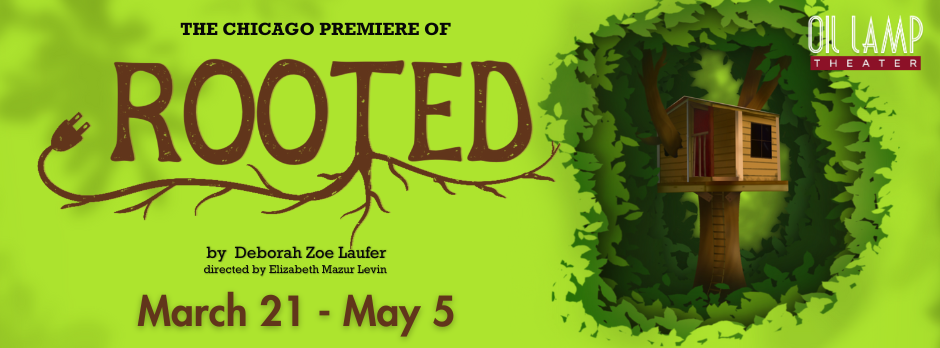
 *** “Rooted”, written by Deborah Zoe Laufer and directed by Elizabeth Mazur Levin, is an unusual show. Billed as a quirky comedy, this clever and insightful narrative tells the story about a woman named Emery (Michelle Perry), who has Agoraphobic tendencies. She lives alone in a treehouse—and has done so for about twenty years. She uses a walker and wears thick glasses. Her main source of company has been her plants. She has created a YouTube channel where she broadcasts to her followers about how plants can remember experiences (like people and animals do), and she runs all sorts of scientific (and pseudo-scientific) experiments to prove her point. Most importantly, she wants to test out her theory that they can recognize “their” person.
*** “Rooted”, written by Deborah Zoe Laufer and directed by Elizabeth Mazur Levin, is an unusual show. Billed as a quirky comedy, this clever and insightful narrative tells the story about a woman named Emery (Michelle Perry), who has Agoraphobic tendencies. She lives alone in a treehouse—and has done so for about twenty years. She uses a walker and wears thick glasses. Her main source of company has been her plants. She has created a YouTube channel where she broadcasts to her followers about how plants can remember experiences (like people and animals do), and she runs all sorts of scientific (and pseudo-scientific) experiments to prove her point. Most importantly, she wants to test out her theory that they can recognize “their” person.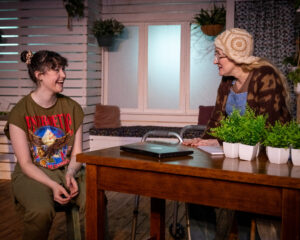
Emery has an older sister named Hazel (Julie Partyka), who works at a restaurant in their small “hick town” of Martinville. Hazel is the only one allowed inside the treehouse, and she brings food to Emery. Hazel also works at a local restaurant as a waitress and is always in fear of her job and needs money. She has dreams of her own: to leave this place and to travel. But she feels an obligation to stay in town and care for her disabled sister.
As a result of Emery’s YouTube videos, she has acquired a following. What’s more, her followers think that she is a very powerful healer and gather around the tree where she lives. But Emery wants to be left alone! She knows she’s not a healer (although she does have dreams at night that tree branches reach out to her). She’s especially upset that these strangers want to see her presence, live and in person.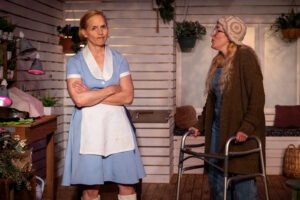
Luanne (Madeline Curtin) is one of her followers. After being trampled on by the crowd below, Hazel takes her into the treehouse to care for her by pulling out a first-aid kit. But Emery is scared to see this stranger in her residence. Luanne insists that she is so grateful to be able to meet “the healer” and see her up close. And, without ruining anything for you, Emery eventually makes the choice to have her as a friend.
What I think is great about the story is the coincidence of different points of view among the three characters having to do with about the nature of reality, spirituality, and natural and preternatural phenomena. The fact that all three characters see the world from a very different perspective is essential to understanding the differences between them. Emery knows that healing of hands or hands-on-healing (or reiki) is very real, and that’s what she uses to feel the plants’ energies. She believes strongly that plants have emotions and can lean on each other if need be, and that’s okay. Hazel pooh-poohs the fact that Emery can feel these energies and feels that her sister is deluded. She does not distinguish between Emery’s talents and her disability. By not buying into any of this, Hazel is perhaps the most practical of the three and a hard-nosed realist—and the least rooted to nature. As Emery says to Luanne at one point (and I paraphrase): “Hazel takes up all the space in the room.” That’s a very astute line that well describes how Hazel only sees the material world and cannot fathom anything possible beyond that. Luanne, however, is the one who lives the most in a dreamworld, and her goal simply is to live in the moment and be happy. She believes that Emery has a great (untapped) power, and it is the interplay between them that makes the audience realize that both characters have a spiritual connection to the earth. It is their rootedness which is at the heart of their mutual love of plants. And both want to discover if plants indeed have personalities.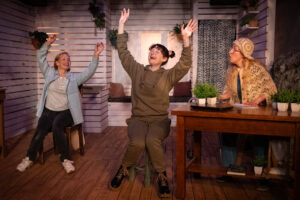
Perry is amazing in the role of Emery. She is clear and convincing all throughout the performance and guides the story well. Yet the show has inconsistencies. My guest and I argued about this for the next twenty minutes afterwards as to whether these flaws were in the acting, the script, or the directing. From my perspective, there were a few holes in the script: For example, at the end, Hazel envisions the possibility of working at the restaurant for the rest of her life, but earlier she states that she has lost her job. She also insists that she will never leave Emery alone with a stranger—and then does so on several occasions.
Isa Noe’s scenic design works well on such a small stage. The set is cute and clever, being that of an elegant treehouse, with wood floors and wood panels on the walls. I especially liked the entryway into the abode. Ellen Marcus’s properties design could not have been better with all of those plants and shelves and the computer… as well as featuring a closet, etc. Lighting is great and nicely demarcates scenes and dream sequences, thanks to Sam Anderson. Sound design by Matt Corey, Gregory Ram, and Jay Pastucha is perfect. And costumes by Janelle Smith are exactly what they should be for the modern era.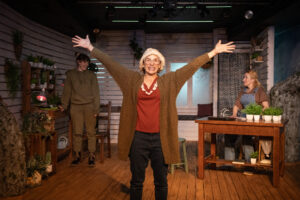
In all, this show is less of a comedy and more of a description of how an agoraphobic woman learns to better cope with her situation. In the end, she, her sister, and her best friend all get to achieve their goals, albeit in highly unusual ways.
The Chicago premiere of “Rooted” is playing through May 5, 2024, at the Oil Lamp Theater, 1723 Glenview Road, in Glenview, Illinois.
 Tickets are $48 adults / $34 students
Tickets are $48 adults / $34 students
Performance schedule:
Thursdays and Fridays – 7:30 p.m.
Saturdays – 3:00 p.m. and 7:30 p.m.
Sundays – 3:00 p.m.
For more information about this show and to purchase tickets, go to: https://www.oillamptheater.org/mainstage-productions/rooted or call 847-834-0738 or visit their box office at 1723 Glenview Road, in Glenview (Tuesday through Friday, 11 a.m. to 4 p.m.).
For general information and to learn about their other offerings, email info@oillamptheater.org or visit https://www.oillamptheater.org/.
To see what others are saying, visit www.theatreinchicago.com, go to Review Round-Up and click at “Rooted”.





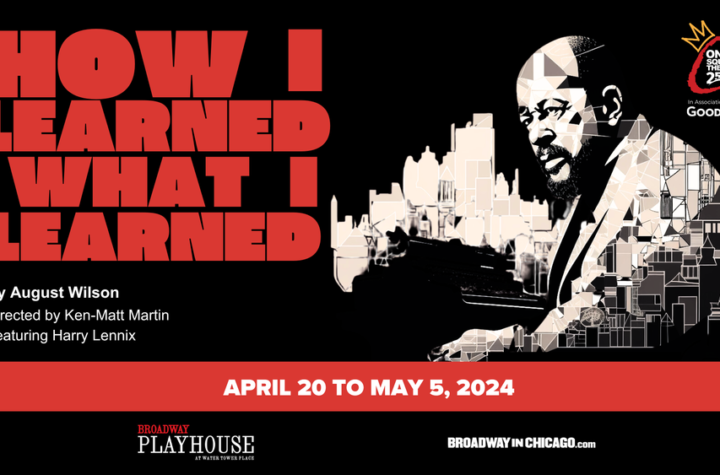
More Stories
“Barefoot in the Park”
“Joe Turner’s Come and Gone”
“How I Learned What I Learned” reviewed by Julia W. Rath